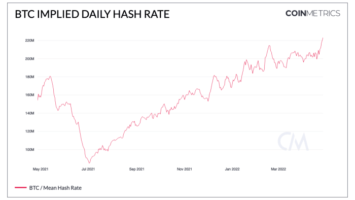Crypto is rapidly gaining in appeal among younger demographics, with 40% of 18 to 35 year old consumers expressing an intent to use cryptocurrencies — such as bitcoin (BTC), ether (ETH), and stablecoins — to pay for goods or services within the next 12 months, according to a new research report.
The report, dubbed “Demystifying Crypto: Shedding light on the adoption of digital currencies for payments in 2022,” was presented at the Bitcoin 2022 conference in Miami on April 6th by global payments provider Checkout.com. It points to an increasingly positive trend in the adoption of cryptocurrencies for online payments.
In 2021, the figure was 30% which “marks a substantial shift in attitude from digital currencies being seen as solely an investment vehicle to a means of doing business on a regular basis,” the report reads. Meanwhile, 23% of online businesses say they are planning to offer crypto payments by 2024.
Crypto offers convenient, safer payment methods
According to the report, this increased consumer openness to cryptocurrency is driven by a broader appetite for more convenient, safer payment methods. Merchants are heeding the call and trying to capitalize on this new trend by providing the underlying infrastructure to support crypto payment methods.
As a result, crypto is already having a material impact on merchants and the market overall. More than $2.5 billion worth of payments were made through Visa’s crypto-backed card in the first fiscal quarter of 2022 alone.
Merchants that have embraced cryptocurrency payments experienced net-new growth, with 82% saying those options allowed them to rapidly attract new customers and reach new demographics.
Almost 70% of the merchants surveyed believe that the speed with which crypto payments can be made and settled has the potential to revolutionize their business models — with over 80% of merchants with existing crypto-payment options saying it was easier to settle than using fiat currencies.
“We believe this is the largest consumer survey of its kind, and the findings present a clear evolution of attitudes towards cryptocurrencies around the world. This is a legitimate transition from the early adoption phase to one that’s more practical, pragmatic, and positive overall.”
Jess Houlgrave, head of strategy for crypto at Checkout.com, said, adding that:
“This transition means there’s a groundswell in demand for fintech companies that can provide easy-to-deploy solutions and services to get merchants up and running with crypto payment options—and then help them optimize the process over time. We expect that trend to only get stronger over the coming year as we bridge more services into Web3.”
Merchants want stablecoins on the balance sheet
According to the report, more than a third of the participants, including CFOs and corporate treasurers, are increasingly interested in holding stablecoins on their balance sheets. They see this as a way to use decentralized finance for treasury management.
Some are going as far as planning to pay vendors and employees in stablecoins — primarily in response to demand from those audiences. Roughly 51% of companies have reported that at least some employees have expressed an interest in getting paid in crypto.
More broadly, new communities of content creators, gamers, and gig workers are embracing crypto — 46% of online creatives say their fans and audiences have sent them digital currencies to support their work.
One other likely scenario held by 65% of C-level executives is that Web3 will materially change the B2C dynamic as consumers increasingly become producers. Houlgrave said:
“The cryptocurrency world is maturing and is increasingly being driven by utility, pragmatism, and empowerment, Checkout.com sees the potential for cryptocurrency to not only transform the way people transact, but also to potentially reinvent the dynamics of the entire digital economy,”
The report surveyed 30,000 consumers and 3,000 merchants in 11 countries, including the U.S., U.K., several western European countries, the UAE, Saudi Arabia, Hong Kong, Singapore, and Australia.
























Comments (No)